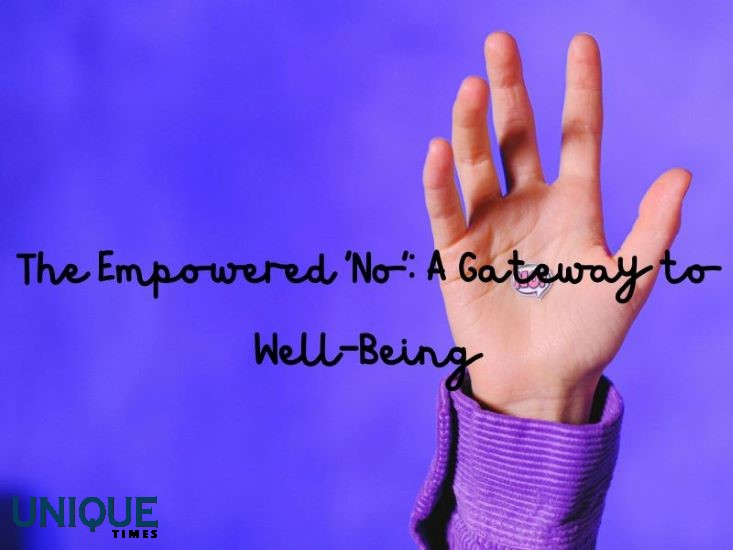Why Learning to Say ‘No’ is Crucial for Your Well-Being

In the intricate tapestry of life, the word ‘no’ holds a unique potency that often goes unrecognized. Learning to wield this two-letter gem with confidence is not just an exercise in assertiveness; it’s a profound act of self-care. This blog delves into the crucial role of saying ‘no’ in nurturing your well-being and establishing boundaries that foster a more balanced and fulfilling life.
1. Boundary Setting for Self-Preservation: Saying ‘no’ is a powerful boundary-setting tool. It creates a shield that protects your time, energy, and emotional well-being. Establishing clear boundaries is not a sign of selfishness but a commitment to self-preservation.
2. Preventing Burnout and Overwhelm: The inability to say ‘no’ often leads to overcommitment and burnout. By learning to decline tasks or responsibilities that exceed your capacity, you safeguard yourself from the detrimental effects of chronic stress and overwhelm.
3. Honoring Your Priorities: Every ‘yes’ is a commitment, and each commitment consumes a portion of your resources. Saying ‘no’ allows you to honor your priorities by allocating time and energy to what truly matters to you. It’s a conscious choice to align your actions with your values.
4. Fostering Authentic Connections: Authentic connections thrive on honesty and transparency. Saying ‘no’ when necessary fosters authenticity in your relationships. It communicates your boundaries and ensures that your interactions are based on genuine intentions rather than obligations.
5. Respecting Your Time: Time is a precious and finite resource. Saying ‘no’ is an acknowledgment that your time is valuable. It empowers you to invest your time in activities that bring joy, growth, and fulfillment, rather than being spread thin across obligations.
6. Cultivating Emotional Well-Being: Constantly saying ‘yes’ to others at the expense of your own needs can lead to emotional exhaustion. Saying ‘no’ is an act of self-compassion, preserving your emotional well-being and preventing the emotional drain that comes from overextending yourself.
7. Empowering Personal Growth: Learning to say ‘no’ is an integral part of personal growth. It involves self-awareness, assertiveness, and the courage to prioritize your needs. This empowerment contributes to a journey of continuous self-improvement.
8. Setting Realistic Expectations: Saying ‘no’ is an acknowledgment of your limitations and a commitment to setting realistic expectations. It prevents the pressure of taking on more than you can handle, fostering a healthier and more sustainable approach to life.
9. Enhancing Productivity and Focus: Overcommitment can dilute your focus and hinder productivity. Saying ‘no’ allows you to concentrate your efforts on tasks that align with your goals, leading to increased efficiency and a greater sense of accomplishment.
10. Embracing the Liberation of ‘No’: Saying ‘no’ is not a rejection but a liberation. It liberates you from the shackles of people-pleasing, guilt, and the burden of excessive obligations. Embracing the freedom of ‘no’ empowers you to shape a life that reflects your authentic desires.
In Conclusion: Saying ‘no’ is a skill that transcends a simple refusal. It is a declaration of self-worth, a commitment to balance, and an assertion of your right to prioritize your well-being. As you navigate the intricate dance of life, let the word ‘no’ be a harmonious note that resonates with the melody of self-care and fulfillment.
Picture Courtesy: Google/images are subject to copyright








